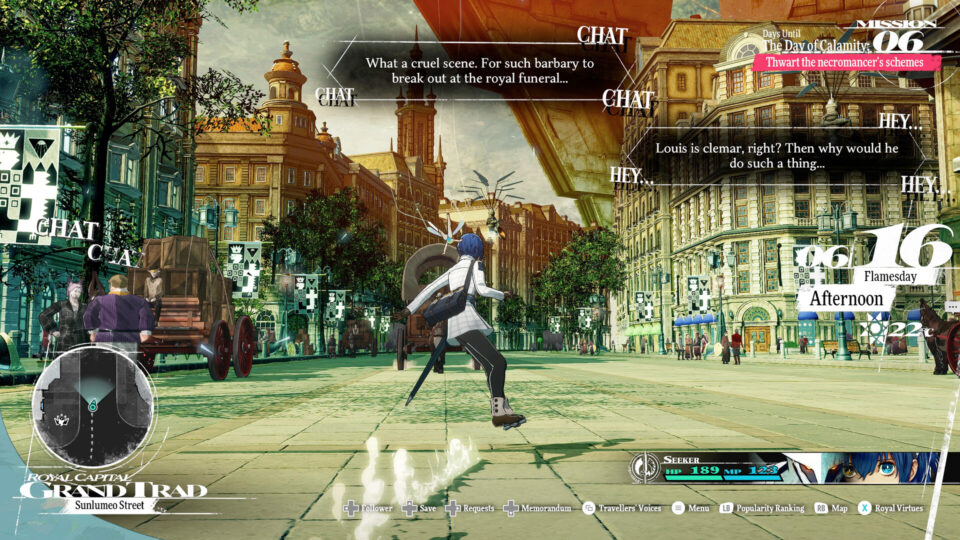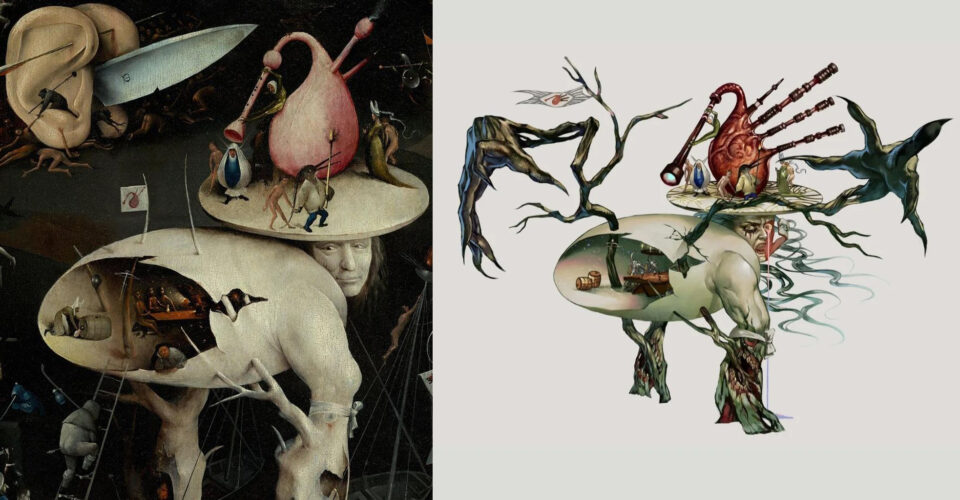In Search of Utopia and The Garden of Earthly Delights in ‘Metaphor: ReFantazio’
From the makers of the ‘Persona’ series, comes a new politically charged fantasy thriller
An idealized utopia is probably the realization of John Lennon’s “Imagine.” That is exactly the message of what ATLUS’ new steampunk medieval fantasy JRPG Metaphor: ReFantazio seeks to convey to its audience.
There is a newly created power vacuum in the United Kingdom of Euchronia. The king has been assassinated, the assassinator gunning for the throne and the crown prince meanwhile, is missing for years and presumed dead. The kingdom has fallen into chaos and the discord, discontent and discrimination among its people are at an all-time high.
Despite being called the United Kingdom of Euchronia, it is anything but. Comprising nine distinct tribes (10if one counts the Half-bloods), your tribe determines your life.
Our journey begins when the protagonist, a boy hailing from the highly discriminated Elda tribe, travels to the capital at the news of the king’s death. He and his fairy companion Gallica are on a mission to break the curse that would result in the killing of the crown prince and restore the throne to the rightful heir.
The spirit of the deceased king however has a different idea — democracy. With the candidacy to rule thrown open to the public, there’s a mad scramble for power. Anyone can be and is in the running, including the protagonist.
To encapsulate the game in one sentence, Metaphor: ReFantazio is a fusion of ATLUS’ Persona and the Shin Megami Tensei series in a fantasy setting.
Part life simulator, part dungeon crawler, the player must master the art of time management. There’s a lot to do in Euchronia — there are missions with deadlines and missions that will alter the fate of Euchronia and its citizens. There are side quests and completing them will undoubtedly give the protagonist a leg up in the elections. These side quests do a great job of fleshing out the world that is Euchronia. There are characters from all walks of life whom you can interact with, who paint a picture of how realities can be radically different.
Sometimes your quests will take you to far off places, which means you need to account for travel time. In Persona 5 you can simply head to your hideout and go right to Mementos, the dungeon without wasting any time, as the game is taking place only in Tokyo. In Metaphor: ReFantazio the world is bigger, which means a day trip isn’t going to suffice. Fortunately, you can use this time to forge stronger bonds with your traveling companions.

The social link system is back, especially since the game centers around competing for the throne based on how well the candidate is liked. The better the bonds the protagonist has among his followers, the better the ruler he will be. Forging these bonds also leads to unlocking Archetypes, who are vital to the ability of the protagonist to survive in the dungeons.
The Archetypes are similar in concept to the ‘Personas’. These are powerful entities who aid the characters in battle. Each Archetype has a specific set of skills and equipment. Unlike the Personas which had to be collected in the dungeons, the Archetypes can only be unlocked by the bond system. One can also customize the skills the Archetype wields to better fit the playstyle. The versatility of wielding multiple Archetypes isn’t limited to the protagonist. Any member of the party can wield any Archetype if it has been studied.
The Archetypes are less Jungian psych, and more job/class-oriented like Knight, Mage, Healer etc. When certain combinations of the Archetypes are present in very particular formations on the battlefield, the Synthesis is unlocked. These are powerful, devastating attacks that can radically turn the tide in battle.
The battle system is a mix of real-time and turn-based combat. One can attack or sneak up on the enemy in real-time to initiate combat. This results in an advantage when the Squad battles begin. The Squad battles are your strategic turn-based combat rounds where you can use your Archetypes and skills on hand to take down larger enemies.
The visuals are where this game really stands out. Everything from the highly stylized UI to the character portraits at the bottom of the screen to the maps are exquisitely illustrated. Since the setting is medieval fantasy, the aesthetic is anime-art-meets-Renaissance era.
The monster art in the game is heavily influenced by The Garden of Earthly Delights from the work of early Renaissance Dutch painter Hieronymus Bosch. The most dreaded enemy creatures our protagonist battles are humans. These ‘humans’ are hardly so, rather they are fantastical monsters.

The Garden of Earthly Delights is a triptych, the left panel depicting The Garden of Eden, the center depicting The Garden of Earthly Delights, and on the right, Hell. When the triptych is closed, the outer panel denotes Creation and unity.
In the Garden of Eden, all is calm and peaceful. The Garden of Earthly Delights on the other hand is very busy. People, animals and vegetation have all congregated and revelry is the only thing on everyone’s mind. Hedonistic is perhaps the best way to describe it. It is certainly not Earth with the strange creatures, amalgamations of man, beast and fruit. Despite the chaos, in the Garden of Earthly Delights there is no sign of hatred, there is no discontent, only happiness. In other words, it is a ‘utopia’ of sorts.
The right panel’s Hell is an entirely different world. The garden imagery is lost in the hellish landscape. There is no peace, fires rage in the distance and the occupants are tortured. Here the animals are punishing mankind for their sins. There is only pain, no pleasure. The only ones who are thriving are the ones inflicting agony.
In Metaphor: ReFantazio, the humans that we come across are not the tortured ones from Hell, but the hedonists from the Garden of Earthly Delights. The citizens of Euchronia are tormented by these ‘humans’, their lives very much resembling the Hell in the painting.
Throughout the course of the game, the protagonist consults a book entrusted to him by the prince. This mysterious book talks of a utopia. A world where there is no discrimination, no hate, no cruelty. A world with an advanced peaceful civilization where equality prevails. The world that the book speaks of, is of course alluding to the one we inhabit. There is a similar book in our world, Thomas More’s Utopia.
In fact, the map of the world in the game has a striking resemblance to Utopia’s own.

There is a subtle irony that our world is a fantasy to characters in a fantasy setting. Strangely enough, there is a More who exists in the game. He is the author of the book the protagonist carries around. Both books (in the game and real life) speak about the same peaceful world. Much like Thomas More, the More in the game has also been imprisoned by his king for creating a book with ideas that criticize the way the world works.
However, there is a stark difference in the theme of ‘utopia’ in Bosch’s The Garden of Earthly Delights and Thomas More’s Utopia. Utopia’s citizens don’t need laws as they are self-governing while The Garden of Earthly Delights is a lawless place. While both have times of peace and happiness, in The Garden of Earthly Delights it leads to the fall of humanity while Utopia’s existence continues without hindrance.
There is a further connection that breaks the fourth wall. When you begin the game, it asks you to name yourself not the protagonist. A mysterious scroll titled ‘The Royal Magic’ that the protagonist deciphers through the course of events, depicts a man resembling the Seeker Archetype who bears the same name you gave yourself right at the beginning.
There’s a lot to unpack in Metaphor: ReFantazio, metaphors included. The allegorical nature of the game will no doubt have you question the nature of ‘utopia’, uniting against the greater evil for the greater good of everyone around you, the endless rat race that makes the world go round and taking initiative to make that difference.





